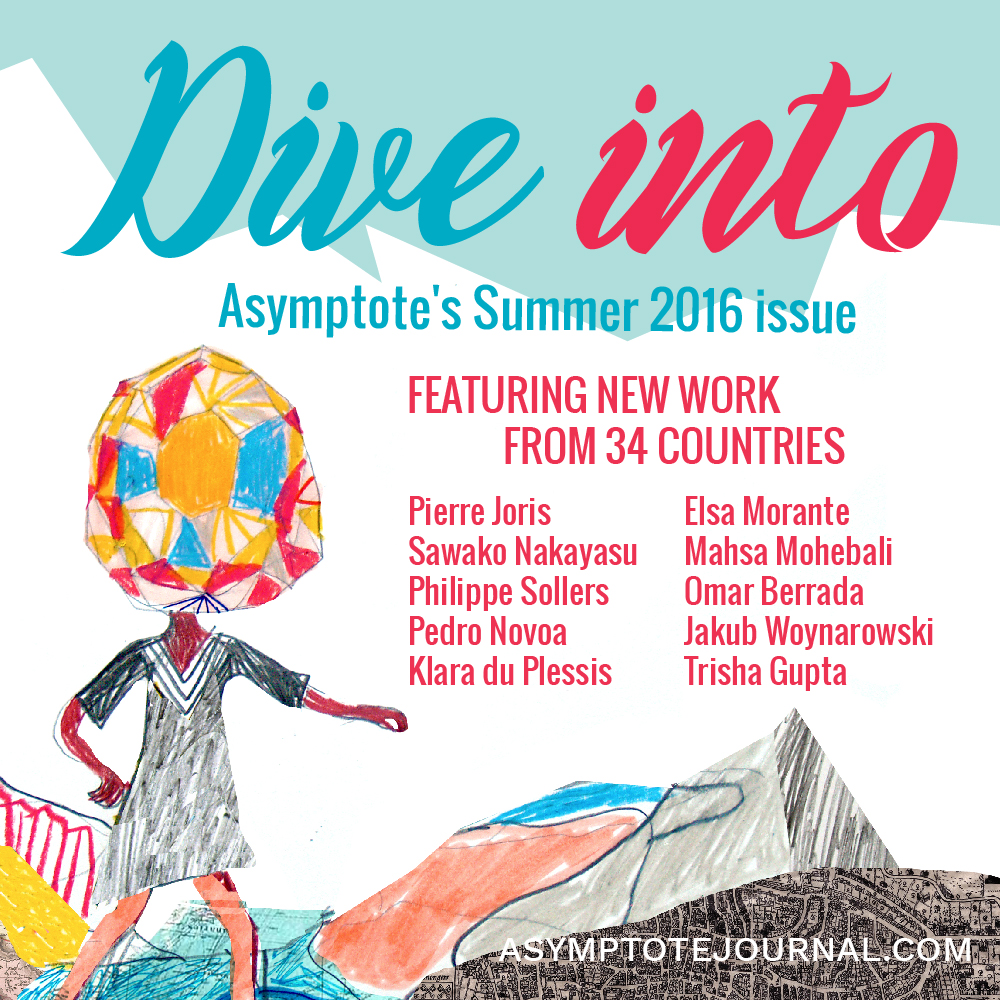Hello, dear readers of Asymptote! First up, a reminder about our ongoing contest that could bring unbeatable literature to your doorstep and flesh out that summer reading list. There are two ways to participate:
- Share your favorite piece from the new issue on social media with the hashtag #ReadAsymptote and you’ll have a chance to win a book. Who doesn’t love books? Especially these ones:
The Collected Poems of Chika Sagawa by Chika Sagawa (tr. Sawako Nakayasu)
Panty by Sangeeta Bandyopadhyay (tr. Arunava Sinha)
The Art of Flight by Sergio Pitol (tr. George Henson)
The Journey by Sergio Pitol (tr. George Henson)
- Send us your favorite piece in the new issue and the reason you love it in 400 words or less. Submit here today for another chance to win one of those precious free books! The deadline for each contest is tomorrow, the 19th of July.
And, secondly, we hope you are as excited as we are about the release of our summer issue, THE DIVE. The issue is packed full of captivating stories, poems, drama, visual art, criticism and interviews from 34 different countries. There are translations from five languages never-before presented in Asymptote (Estonian, French Creole, Kiezdeutsch, Old English, and Xitsonga) as well as our second-ever Multilingual Writing section. Here at the Asymptote Blog, we’ve picked our highlights, listed below, in no particular order.
Television: The Thousand and One Nights by Robert Merino, translated from Spanish by Neil Davidson. Recommended by Allegra Rosenbaum, Blog Editor.
Robert Merino describes the arrival of a television in his childhood home in Chile. The writing is very much a stream of life events, surrounded by this electronic piece of furniture. We watch Merino grow up and come of age throughout the essay with television. It is the center of his universe, his upbringing, his babysitter, and his cultural education.
But the television for Merino was also political, and brought together all socio-economic groups to laugh and observe experiences from their own lives diluted through a screen. Merino’s writing, however, is far from diluted. It is a rich cultural commentary on the importance of television in the 20th century and the writing itself is pungent with voice and imagery.
Divided into three parts, Robert Merino’s essay will wash over you with memory and nostalgia. It will bring you back to quotidian moments of the past and have you contemplate those of the present. Its emphasis on the routine, the day-to-day images of life that we so often glaze over is welcome in the days of action and glory. With writing like this, thrill is unnecessary.
Poachers, by Alessandro Cinquegrani, translated from Italian by Matilda Colarossi. Recommended by Nina Sparling, Assistant Blog Editor.
There is much to love in the July 2016 issue of Asymptote THE DIVE, but the sounds around me stopped while reading Alessandro Cinquegrani’s “Poachers.” The words inflated to form a soundproof barrier of rhythms and tones. It was, in fact, rather like the sensation of a well-arched dive into the deep end of an empty pool. This is how I pick books—by their ability to blockade the white noise with the same satisfying whoosh of surrounding my body with water in one swift motion.
Though an excerpt of a novel, “Poachers” at moments reads like an extended stream-of-consciousness prose poem. This is a text most of all about thinking. The narrator repeats over and over “I think,” an expression of uncertainty, desperation, and profound loneliness. The sentences are long—the repetition of the phrase gives the text structure, functioning almost as a form of punctuation. Translator Matilda Colarossi renders the text beautifully in English, capturing nuanced emotional textures with a natural and fluid tone.
Cinquegrani makes reference to Marc Chagall’s haunting painting, The Promenade. Chagall depicts a man and woman walking through rolling hills, holding hands. But she floats above him, almost out of the frame, at a forty-five degree angle to the earth. Cinquegrani draws on a similar image-phrase throughout his work: “my cloud of raw expiation on a leash.” His wife suffers severe panic attacks that no doctor seems able to help. Her illness (and the tragedy that results) remains obscure yet casts an unavoidable shadow over the narrator. It is ever-present and impossible to grasp. The narrator follows train tracks, looking.
Dive into the Summer Issue of Asymptote here!
*****
Read more Issue Highlights:

